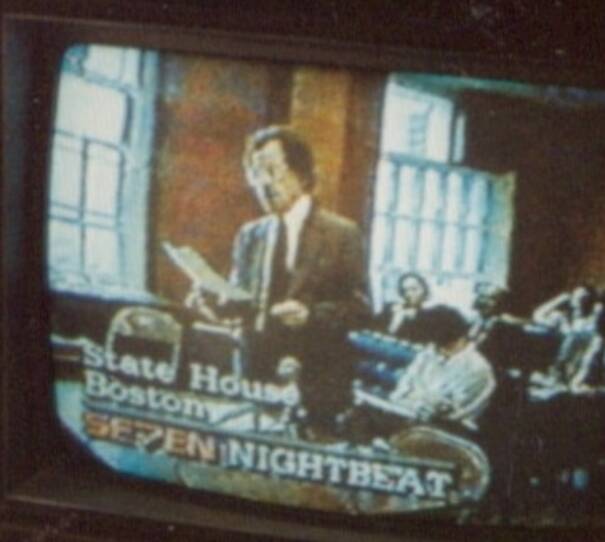Updated March 1, 2023
It's likely that when Arthur J. Marsh, a Wellesley music teacher, set out to compose what he hoped would become Massachusetts' state song in the mid-1950s, he had no idea that he was starting a trend.
Marsh’s sweeping anthem, "All Hail To Massachusetts," was first performed at Nantasket Beach in the summer of 1954. A decade later, it was selected by a commission chaired by legendary Boston Symphony Orchestra conductor Arthur Fiedler to be the official state song. In the fall of 1966, it was codified as such by an act of the legislature.
Since then, six additional official state songs have been named. While they range from celebratory to catchy, and encompass genres as distinct as folk and polka, they also lack diversity — and don’t take advantage of the immense homegrown talent the Bay State has to offer. At a time when other state emblems — including the motto, seal and flag — are being re-examined, it seems fair to ask: Is it also time for a state disco track? Or a hip-hop song?
With lyrics like “She stands upright for freedom’s light that shines from sea to sea: All hail to Massachusetts! Our country ’tis of thee!”, patriotic seems like a fair characterization of Massachusetts’ original state song.
And yet, it is not the official patriotic song of the commonwealth. That honor belongs to a different tune: “Massachusetts (Because of You Our Land Is Free),” with words and music by Dorchester-born Bernard Davidson, a businessman, local politician and lifelong Boston resident who passed away in 2016.
“A lot of people always said that my dad missed his calling,” said Brookline’s Susie Davidson, daughter of the song’s composer. “He was like a showman. He was always writing songs, ditties and poems and rhyming things.”
Davidson said her father launched a personal campaign in the mid-to-late 1980s to get his song officially recognized by the legislature that included performing it “anywhere he could,” including at the State House.

“That earned him a lot of ridicule,” she said. “He henceforth was deemed a ‘worst of’ in Boston Magazine for singing the song at the State House ... and ridiculed in the [Boston] Herald. That didn’t stop him. He didn’t care. It only made him push further for it.”
Davidson said that it all paid off in 1989, when her father’s song finally earned the official seal of approval from the legislature and then-Gov. Michael Dukakis. “This was one of his big dream projects in life that came to fruition for him,” she said.
Now, if you’re less into anthems and more into odes, you’re in luck! Massachusetts also has an official ode of the commonwealth. The aptly titled “Ode to Massachusetts” was written by Joseph “One Man Band” Falzone, a longtime fixture on the East Boston parade circuit.
Falzone worked at Suffolk Downs in Revere and was a “musician and comedian on the side,” according to his 2016 obituary. His song earned its official designation in 2000 and was described as one of Falzone’s “most prized accomplishments.”
In the event that you’d rather sit by the piano or with an acoustic guitar for an intimate musical session brimming with state pride, there’s a song for you as well: the official folk song of the commonwealth since 1981, Arlo Guthrie’s “Massachusetts.”
More in the mood for a group sing-along? Why not gather some friends for a rousing rendition of the official state glee club song, “The Great State of Massachusetts?”
The words were hastily worked up by Worcester politician George A. Wells — a delegate to the 1960 Democratic National Convention — and set to music by his pal J. Earl Bley as a theme song of sorts for the party’s presidential nominee that year, John F. Kennedy.

If dancing is more your thing, you also have options. You can stomp and stride to the traditional fife and drum tune “Road to Boston,” which also happens to be the official ceremonial march of the commonwealth.
Or you could cut loose with some triple steps, corner turns and promenades to the official state polka, “Say Hello to Someone in Massachusetts.”
“I didn’t record that song with any intentions and making it a state song. I just recorded it as a tribute to Massachusetts,” said Lenny Gomulka, the song’s composer. Gomulka is Grammy-nominated, Chicago-born and now a proud resident of Western Massachusetts.
Gomulka wrote and recorded the song with his band The Chicago Push for their 1987 album Home is Where the Heart Is. Upon its release, a local DJ at WMUA, the University of Massachusetts Amherst radio station, suggested they make a push for it to become a state song.
“He spearheaded it,” Gomulka said. “And the next thing you know, we were going to the State House. It was really a nice feeling.”
While Massachusetts boasts more state songs than most, the list can also be seen as incomplete. Taken together, the seven songs fall short of capturing the sheer diversity of the state’s musical landscape.
“Do they represent who we are? Do they represent the best of who we aspire to be? I think ... that’s what anything that’s labeled as a state anything should do,” said Emmett G. Price III, Dean of Africana Studies at Berklee College of Music. “The notion of a song that represents ‘we’ is ironic in a season when we’re still trying to figure out, what does ‘we’ mean?
“So the notion of ‘All Hail to Massachusetts,’ that’s cool, except for the fact that if you’re not going to talk about the Indigenous, then I’m not sure that song represents ‘we,’ right?” Price continued. “Or if you’re going to [sing] about ‘pilgrim’s pride,’ then I’m gonna excuse myself from from singing a chorus of that or two.”
Absent in the stable of state songs are any examples from a number of musical styles with storied histories here, including genres dominated by artists of color. Many foundational jazz legends, including saxophonist Johnny Hodges of Cambridge and drummer Roy Haynes of Boston, are Massachusetts-born.
“You think about jazz. Oh my goodness. I mean, one of the greats in the nation right now, born and raised in the Boston area, Terri Lyne Carrington,” Price said. “How do you not tap into that homegrown talent?”
And then there is hip-hop, an American-born genre with global influence and staying power rivalling that of jazz, country and rock and roll.
“You have Guru — Keith Elam — who’s born and raised in Roxbury [and] goes on and does not only ‘Jazzmatazz,’ but so many other things,” Price said. “And do you have Ed O.G.? I mean, who could forget about Ed O.G. & Da Bulldogs? And contemporary folks in the hip-hop realm like Cliff Notez, Najee Janey, Oompa, so many other folks.”
And of course, the Queen of Disco herself, Donna Summer, was born and raised in Mission Hill.
“When I think about somebody like Donna Summer, who finally has her own street, you know ... she really repped Boston throughout her career,” Price said. “And the fact is that Boston didn’t necessarily give her love back for what she did until, you know, posthumously, which I think is a tragedy.”
As for whether Price had a specific nominee in mind for an additional state song that might strike a more inclusive note, he went a step further, suggesting that Massachusetts do something truly unique: become the first in the nation to adopt an official state playlist.
“Wouldn’t it be amazing, and think about what that means in terms of a representative democracy: we’re not privileging one sound over another, we’re not privileging one culture over another,” he said. “I want it to be a sonic representation of who we are as human beings, so that we don’t create this notion of monolithic homogeneity — zombieism, as I call it. I want to hear us in all of our grandeur.”
The fight to expand the roster of state songs recently bubbled up in state politics. Dueling campaigns broke out in an effort to name yet another state song — a rock song. There was Team “Roadrunner” by the Modern Lovers, led by then-State Rep. Marty Walsh, and Camp “Dream On” by Aerosmith, headed by Reps. Josh Cutler of Duxbury and James Cantwell of Marshfield. In the end, both efforts came up short, and to this day the commonwealth remains without an official rock song.
That said, believe it or not, Massachusetts does have three different, actual rocks that have been honored by the legislature: Roxbury Puddingstone, which is the official rock or rock emblem of the commonwealth; Plymouth Rock, the historical rock of the commonwealth; and, finally, the state explorer rock: Dighton rock.
Correction: A previous version of this article incorrectly stated that Bernard Davidson was a lifelong Dorchester resident; he also lived in Malden in Randolph. It also corrected the year his song was officially named the state’s patriotic song.








